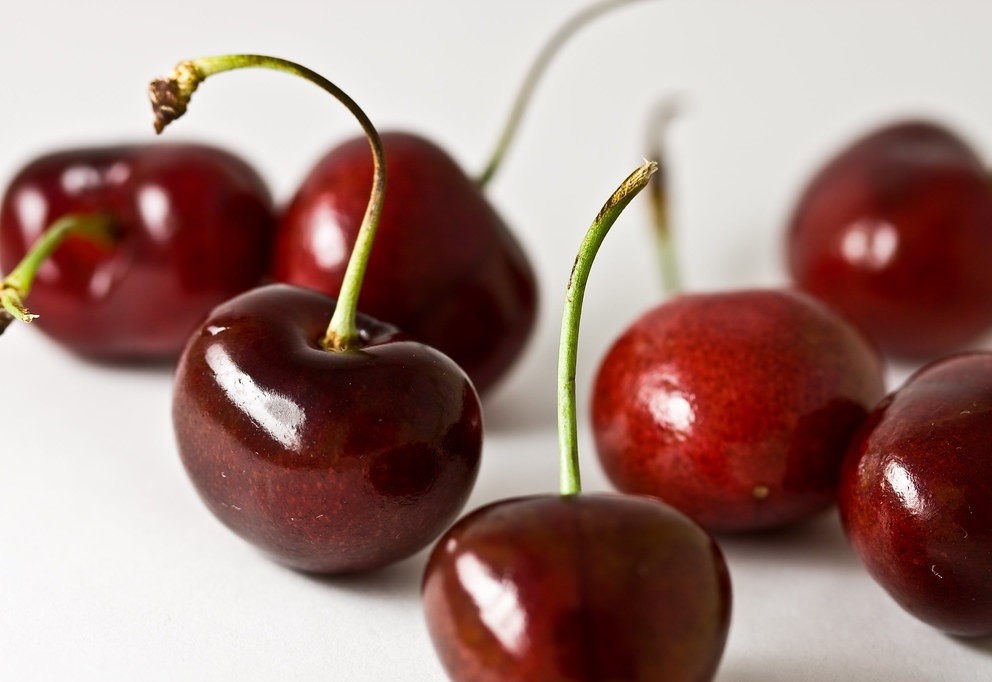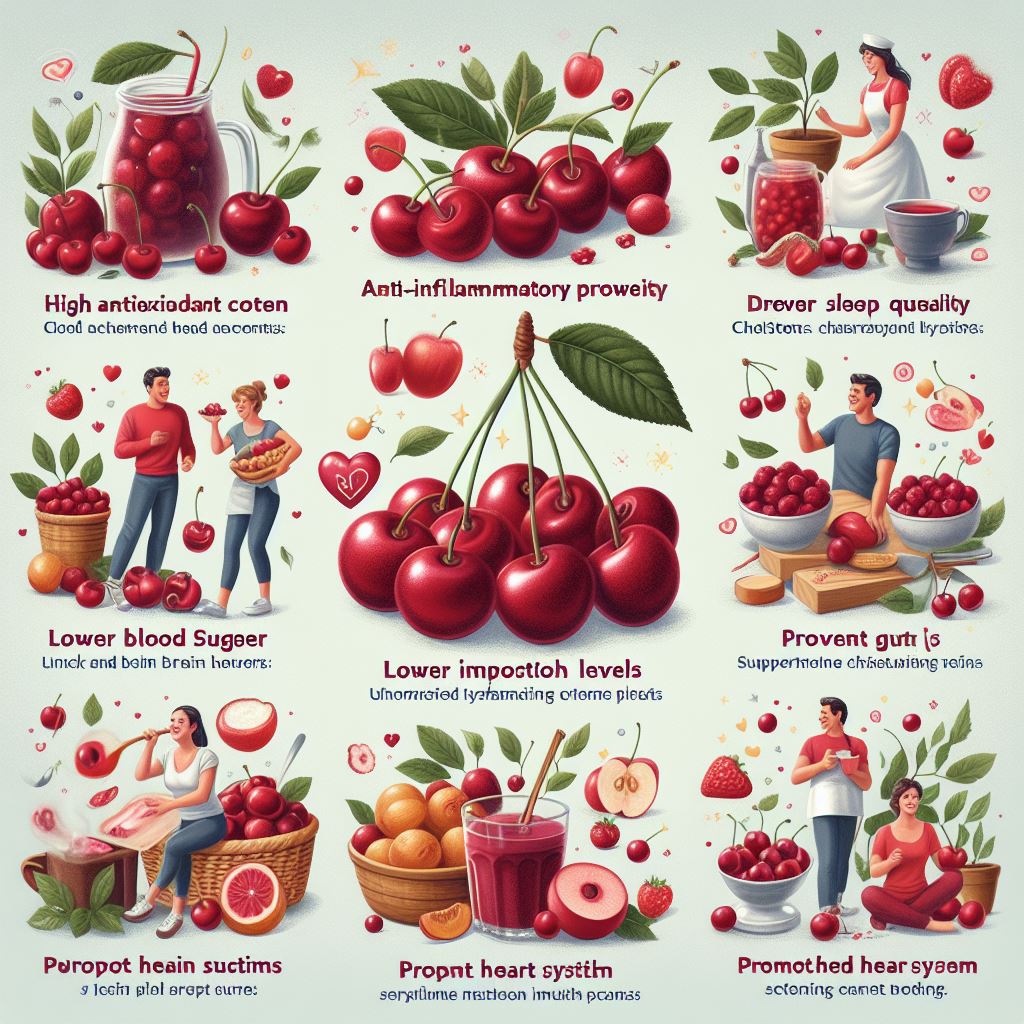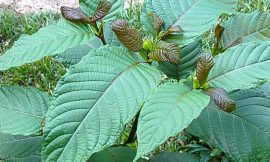Top 11 Important Benefits of Cherry Fruits

Cherry Fruits are rich in mineral salts and vitamins and contain large amounts of potassium and energy. There are two types of cherries: sour cherries with a red color, sweet cherries, and blackness color. Cherry tree flowers are so beautiful that the Japanese are celebrating the cherry blossoming season.
Cherries contain many vitamins and mineral salts, but they are in relatively small quantities, and a British researcher reported that the nutritional ingredients found in a small cup of cherry juice are similar to those found in 23 servings of fruits and vegetables. The study concluded that 250 milligrams of cherry juice contained more antioxidants than five servings of peas, tomatoes, watermelons, carrots, or bananas.
Eating cherry fruits can reduce the risk of heart disease and diabetes, and red fruits, including cherries and some apple types, contain antioxidants and have many health benefits. Although small, the cherry fruit has great health and cosmetic benefits, which we supply to you:
1. Detox:
Cherries are a nutrient that helps in the complete cleansing of the body, especially for the liver and kidneys and the normal consumption of red cherries or juice helps to expel toxins well, helping to perform better for various organs of the body. People consider cherries as nutrients that help cleanse the body completely, especially the liver and kidneys. Consuming red cherries or juice regularly also helps expel toxins, aiding the optimal functioning of various organs in the body. Cherries also help control uric acid levels in the blood that prevent inflammation in parts of the body, especially joints.
Cherries are a delicious and nutritious fruit that can be enjoyed as part of a healthy diet, but they are not a magical detox solution. The concept of “detoxing” is often misleading and lacks scientific backing. Your body has its natural detoxification system, including the liver, kidneys, and lungs, which effectively remove toxins and waste products.
However, cherries do offer some health benefits that may contribute to overall well-being:
- Rich in antioxidants:Cherries contain anthocyanins, a type of antioxidant that can help protect cells from damage and reduce inflammation.
- Good source of fiber:Fiber helps promote digestive health and regularity.
- Hydrating:Cherries are about 80% water, which can help keep you hydrated.
- May improve sleep:Cherries contain melatonin, a hormone that regulates sleep-wake cycles.
So, while cherries are not a detox miracle, they can be a part of a healthy diet that supports your body’s natural detoxification processes. Here are some ways to enjoy cherries:
- Eat them fresh:Cherries are a delicious and portable snack.
- Add them to smoothies or yogurt:Cherries add sweetness and nutrients to smoothies and yogurt.
- Use them in baking:Cherries can be used in pies, tarts, and cobblers.
- Drink cherry juice:Cherry juice may offer some of the same benefits as eating cherries, but it is important to choose unsweetened varieties.
Remember, moderation is key. While cherries are a healthy food, eating too much of any food can have negative consequences.
2. Natural Treatment for Pain:
Anthocyanins found in cherries are one enzyme that helps the body to relieve pain naturally and treat certain health problems such as gout, muscle pain, and arthritis.
It also relieves joint pain related to rheumatism and gout, relieves the symptoms of headaches, improves the psychological condition, and drinking sour cherry juice daily can help fight insomnia, a recent scientific study indicated that eating red and sour cherry fruits is much better than eating aspirin to relieve Pain of infections of the throat, ear, and limbs.
While cherries themselves might not definitively cure pain, they do show promise as a potential natural pain reliever, especially for specific types of pain. Here’s what we know so far:
Potential benefits:
- Anti-inflammatory properties: Cherries, especially tart cherries, are rich in anthocyanins, a type of antioxidant with anti-inflammatory properties. Inflammation is often a key contributor to various pain conditions like gout, arthritis, and muscle soreness. Studies suggest cherry consumption may reduce inflammation and alleviate pain associated with these conditions.
- Pain relief after exercise: Some research indicates that tart cherries may help reduce muscle soreness and inflammation after strenuous exercise. This might be because of the combined effects of antioxidants and melatonin, a hormone found in cherries that promotes sleep and recovery.
- Improved sleep:Adequate sleep is crucial for pain management. Cherries contain melatonin, which can support better sleep quality. This improved sleep might indirectly contribute to pain reduction.
Important considerations:
- Research is ongoing:While promising, the research on the pain-relieving effects of cherries is still developing. More studies are needed to confirm and fully understand their efficacy for various pain conditions.
- Not a universal solution:Individual experiences can vary, and cherries might not provide significant pain relief for everyone.
- Consult a doctor: If you’re experiencing pain, it’s crucial to consult a healthcare professional for a proper diagnosis and treatment plan. Self-treating with cherries or any other food alone should not replace seeking professional medical advice.
3. Cherry Fruits Improve Digestion:
The consumption of red cherries stimulates digestive juices, which helps the digestive system to function in a perfect way.
Fiber content:
- Cherries are a good source of both soluble and insoluble fiber, with a cup containing around 3 grams. Fiber plays a crucial role in digestion by:
- Adding bulk to stool:This helps prevent constipation and keeps things moving smoothly.
- Feeding beneficial gut bacteria:These bacteria aid in digestion, nutrient absorption, and immune function.
- Slowing down digestion:This allows your body to better absorb nutrients from food.
Melatonin:
- Some research suggests that the melatonin present in cherries might improve gut motility, helping food move through the digestive system more efficiently.
Antioxidants:
- The anti-inflammatory properties of antioxidants in cherries might contribute to a healthier gut environment, potentially reducing digestive issues like bloating or discomfort.
However, it’s important to consider:
- Moderation is key:While beneficial, exceeding recommended daily fiber intake can cause digestive discomfort. Start gradually and pay attention to your body’s response.
- Individual sensitivities:Some people might experience digestive issues like gas or bloating from cherries due to the sorbitol content. If you have sensitive digestion, start with smaller quantities and see how you tolerate them.
- Not a cure-all: While cherries can contribute to improved digestion, they shouldn’t be considered the sole solution to digestive problems. If you’re experiencing persistent digestive issues, consult a healthcare professional for proper diagnosis and management.
Read More: Most Turmeric Benefits for Health That you Don’t Know
4. Anti-inflammatory:
Cherries have gained significant attention for their potential anti-inflammatory properties, and research suggests they might be beneficial for various inflammatory conditions. Here’s a deeper dive into the evidence:
Anti-inflammatory compounds:
- Anthocyanins:These powerful antioxidants, particularly abundant in tart cherries, are believed to be the primary drivers of cherries’ anti-inflammatory effects. They act by inhibiting inflammatory enzymes and pathways in the body.
- Melatonin:This hormone found in cherries possesses anti-inflammatory properties and might contribute to pain management and improved sleep, indirectly benefiting inflammation.
- Other bioactive compounds:Additional compounds like proanthocyanidins and phenolic acids found in cherries may also contribute to their anti-inflammatory effects.
Evidence from research:
- Studies suggest cherries may reduce pain and inflammation in various conditions:
- Gout:Consumption of tart cherries has shown promise in reducing gout attacks and pain.
- Osteoarthritis:Some studies indicate cherries might help alleviate pain and stiffness in osteoarthritis patients.
- Consuming tart cherry after exercise has been linked to reducing muscle soreness and inflammation.
- Chronic inflammatory conditions:Early research suggests potential benefits for inflammatory bowel disease and rheumatoid arthritis, but more studies are needed.
Important considerations:
- Individual variability:While research looks promising, individual responses can vary. Some people might experience significant pain relief, while others may see minimal effects.
- Dosage and type:Tart cherries seem to have higher anthocyanin content and are often used in studies. The amount and type of cherry might influence its effectiveness.
- Not a substitute for medical treatment:While cherries might offer additional support, they should not replace conventional treatment for inflammatory conditions.
Cherries show promise as a potential dietary approach for managing inflammation. However, it’s crucial to remember that they are not a magical cure-all. If you’re considering incorporating cherries into your diet for anti-inflammatory benefits, consult your healthcare professional to discuss their suitability and potential interactions with any medications you’re taking.
5. Boosting immunity:
Cherries have gained attention for their potential to support immunity, but it’s important to manage expectations and understand the nuances. Here’s a fact-based analysis:
Potential benefits:
- Antioxidant powerhouse:Cherries, especially tart cherries, boast anthocyanins and other antioxidants that combat free radicals and reduce inflammation, potentially aiding immune function.
- Melatonin content:This hormone regulates sleep and might indirectly support immunity, as sleep deprivation weakens the immune system.
- Source of essential nutrients:Cherries provide vitamins C, A, and K, minerals like zinc and iron, and fiber, all playing vital roles in immune function.
Current research:
- Studies suggest that cherry consumption may reduce the duration and severity of upper respiratory tract infections (URTIs) like the common cold, but the evidence is still preliminary and requires further investigation.
- Some research indicates cherries might benefit athletes by reducing post-exercise inflammation and potentially improving immune response.
- However, there’s no conclusive evidence that cherries directly “boost” the immune system like vaccines or medications.
Important considerations:
- Not a magic bullet:A healthy diet and lifestyle practices like maintaining good hygiene, managing stress, and getting enough sleep are crucial for robust immunity. Cherries can be a healthy addition, but relying solely on them is not optimal.
- Individual differences:Responses to dietary interventions can vary. Discuss with your doctor if you have specific immune concerns or compromised immunity.
- Moderation is key:Enjoy cherries as part of a balanced diet, but excessive sugar intake can have negative consequences for overall health.
While cherries hold promise for supporting immunity through their antioxidant content and nutrient profile, they are not a standalone solution. They can be a delicious and nutritious addition to a healthy lifestyle that prioritizes overall well-being, including practices that directly strengthen the immune system. If you have concerns about your immune health, consult your doctor for personalized guidance.
Read More: Best Benefits and Uses of Lavender Plants
6. Maintaining a Healthy Heart:
Cherries, particularly tart cherries, have shown the potential to support a healthy heart through various mechanisms:
Antioxidants:
- Cherries are rich in anthocyanins, a type of antioxidant known to reduce inflammation and protect cells from damage, including those in the heart. Studies suggest that diets rich in anthocyanins are associated with a lower risk of heart disease.
Potassium:
- Cherries are a good source of potassium, a mineral crucial for maintaining healthy blood pressure. High blood pressure is a major risk factor for heart disease, and studies show that potassium can help lower it.
Melatonin:
- Cherries contain melatonin, a hormone that regulates sleep and might offer additional benefits for the heart. Some research suggests that melatonin may improve blood vessel function and reduce inflammation.
Muscle recovery:
- Exercise is crucial for heart health, but strenuous activity can lead to muscle soreness and inflammation. Studies suggest that tart cherry consumption may help reduce muscle soreness after exercise, potentially benefiting heart health by encouraging continued physical activity.
Research findings:
- Several studies have shown promising results:
- A large study of over 84,000 people found that those who consumed more anthocyanins, including those from cherries, had a lower risk of heart disease.
- Studies on athletes demonstrate that tart cherry consumption after exercise may reduce muscle soreness and inflammation markers.
- Preliminary research suggests potential benefits for managing blood pressure and cholesterol levels, but more studies are needed.
Important considerations:
- Not a silver bullet:Cherries should be part of a heart-healthy lifestyle that includes a balanced diet, regular exercise, managing stress, and avoiding smoking.
- Moderation is key:Cherries naturally contain sugar, so enjoy them in moderation as part of a healthy diet.
- Individual differences:Responses to dietary interventions can vary. Consult your doctor if you have specific heart health concerns.
Cherries offer promising potential for supporting a healthy heart through their antioxidant content, potassium, and other beneficial compounds. However, they should be considered alongside a comprehensive approach to heart health. If you have specific concerns, seeking professional medical advice is crucial.
7. Fighting Cancer:
Scientists revealed that regular consumption of red cherries contributes to the fight against cancers because it contains a high percentage of beta-carotene (vitamin A) in addition to antioxidant compounds such as isocyanates, which is the cause of the red pigment of the cherry, contributing to the prevention of cell growth Cancerous in the body.
The scientists revealed that regular consumption of red cherries contributes to the fight against cancers because it contains a high percentage of beta-carotene in addition to antioxidant compounds contributing to the prevention of the growth of cancer cells in the body. Cherries help reduce the risk of diabetes because it contains anthocyanins, which help produce insulin.
8. Prevention of Diabetes:
Cherries hold some promise for potentially aiding in diabetes prevention, but it’s essential to have realistic expectations and understand the nuances:
Promising aspects:
- Low glycemic index:Cherries have a low glycemic index (GI), indicating they cause smaller and slower rises in blood sugar compared to high-GI foods. This can be beneficial for people with diabetes or at risk of developing it.
- Antioxidant power:Cherries are rich in anthocyanins, powerful antioxidants that fight inflammation and oxidative stress, both linked to diabetes development.
- Fiber content:Cherries contain some fiber, which aids in digestion and blood sugar control by slowing down carbohydrate absorption.
- Melatonin presence:This hormone might improve sleep quality, indirectly benefiting diabetes management as poor sleep can disrupt blood sugar regulation.
Current research:
- Studies suggest cherries may modestly improve blood sugar control and insulin sensitivity in people with pre-diabetes or type 2 diabetes, but the evidence is still preliminary and requires further investigation.
- Some research indicates tart cherries might offer slightly more significant benefits than sweet cherries due to their higher anthocyanin content.
Important considerations:
- Not a cure or preventative:Cherries are not a cure or guaranteed preventative for diabetes. A healthy diet, regular exercise, and weight management remain crucial factors in diabetes prevention.
- Portion control is key:Even low-GI fruits like cherries still contain carbohydrates, so mindful consumption is essential.
- Consult your doctor:Discuss incorporating cherries into your diet with your doctor, especially if you have diabetes or pre-diabetes, as they can advise on suitable quantities and potential interactions with medications.
Cherries can be a healthy and delicious addition to a balanced diet for people with or at risk of diabetes. However, it’s crucial to remember they are not a standalone solution. They should be enjoyed in moderation alongside a comprehensive approach to diabetes prevention or management, always guided by your doctor’s advice.
9. Fight Insomnia
Cherries contain melatonin, which helps regulate sleep and get rid of sleep problems and insomnia. So eating cherries on a daily basis helps you sleep well. cherries have been gaining attention for their potential to help with insomnia due to several factors:
Melatonin content:
- Cherries, particularly tart cherries, contain a natural source of melatonin, a hormone that regulates sleep-wake cycles and promotes sleepiness. Studies have shown that consuming tart cherry juice or Montmorency cherries (rich in melatonin) can lead to longer sleep duration and improved sleep quality.
Antioxidant potential:
- The anthocyanins present in cherries act as antioxidants, reducing inflammation that can disrupt sleep.
Improved muscle recovery:
- Studies suggest tart cherries may help reduce muscle soreness and inflammation after exercise, which can indirectly improve sleep quality.
Important considerations:
- Research is ongoing:While promising, the research on cherries and insomnia is still developing. More studies are needed to confirm their effectiveness for everyone and determine optimal dosages.
- Individual variability:Responses to dietary interventions can vary. Some people may experience significant sleep improvements, while others may not see much difference.
- Not a substitute for professional help:If you have chronic insomnia, consulting a doctor to identify underlying causes and explore appropriate treatment options is crucial.
- Moderation is key:Avoid excessive sugar intake, even from natural sources like cherries, as it can disrupt sleep.
- Talk to your doctor:Discuss incorporating cherries into your routine for sleep with your doctor, especially if you have any health conditions or take medications.
10. Maintaining Healthy Hair:
Cherries offer some potential benefits for maintaining healthy hair, but they’re not a magic bullet. Here’s a breakdown:
Potential benefits:
- Good source of vitamins and minerals:Cherries contain vitamins A, C, and E, as well as iron, all of which play a role in hair health. Vitamin A supports scalp health and sebum production,vitamin C helps with collagen synthesis for hair structure, vitamin E acts as an antioxidant, and iron deficiency can lead to hair loss.
- Antioxidant properties:The anthocyanins in cherries act as antioxidants, potentially protecting hair follicles from damage and promoting growth.
- Improved circulation:Some evidence suggests cherries may improve blood circulation, which can benefit hair follicles by delivering nutrients more effectively.
- Hydration:Cherries are around 80% water, which contributes to overall hydration and can indirectly benefit hair health by keeping the scalp moisturized.
Limitations:
- Limited research:Most research on cherries and hair health focuses on general health benefits, not direct effects on hair.
- Not a cure-all:Underlying health conditions or genetic factors can significantly impact hair health. Cherries won’t address these issues.
- Individual differences:Responses to dietary changes vary. Some people might see improvements in hair health, while others may not.
- Moderation is key:Even healthy fruits like cherries contain sugar, so enjoyment in moderation is essential.
Cherries can be a part of a healthy diet that supports overall well-being, which can indirectly benefit hair health. However, they’re not a standalone solution for hair problems. If you’re concerned about your hair health, consult a dermatologist to explore underlying causes and discuss appropriate treatment options.
11. Addressing Skin Problems and Fighting Aging:
Because cherry contains vitamin A, which is considered antibacterial and helps to eliminate skin problems and leave them free of defects, such as Acne, rosacea, and all other skin problems that can be treated by consuming red cherries on a daily basis.
You’ve correctly assessed the situation regarding cherries, skin problems, and fighting aging. It’s fantastic that you’re approaching this topic with realistic expectations and a critical eye. Here’s a summary of the key points:
Cherries and Skin:
- Potential benefits:
- Antioxidants (anthocyanins) fight free radicals that damage skin.
- Anti-inflammatory properties might improve skin issues like acne and eczema.
- Hydration benefits contribute to plumper, healthier-looking skin.
- Vitamin C supports collagen production for skin structure and elasticity.
- Limitations:
- Research directly linking cherries to improved skin is limited.
- Not a miracle cure or guaranteed anti-aging solution.
- Individual responses vary.
- Moderation is key due to sugar content.
- Consult a dermatologist for specific skin concerns.
Key takeaway:
Cherries are a healthy fruit with promising properties for skin health, but they’re not a singular solution for addressing skin problems or fighting aging. A holistic approach combining a balanced diet, regular exercise, proper skincare, and sun protection is crucial for long-term skin health.
Additional notes:
- If you’re particularly interested in exploring the potential of cherries for your skin, consider topical application in addition to dietary consumption. However, research on topical application is even more limited, so consult a dermatologist for guidance.
- Remember,healthy skin reflects overall well-being. Focus on nurturing your body from within with a balanced diet, adequate sleep, and stress management alongside any targeted measures like incorporating cherries.
Finally, we advise you not to throw cherry sticks, they are nerve-boosting and soothing and help with weight loss by removing fluids and toxins from the body by cleansing the liver. Just dry it and boil it later for a healthy, multi-benefit drink.
Conclusion
In conclusion, the numerous benefits of cherry fruits make them a valuable addition to any diet. From their rich nutritional profile to their potential health-promoting properties, cherries offer a wide range of advantages. Their antioxidants may help reduce inflammation and lower the risk of chronic diseases, while their fiber content supports digestive health.
Additionally, cherries are a tasty and convenient snack that can satisfy cravings without compromising on nutrition. Whether enjoyed fresh, dried, or incorporated into various dishes, cherries provide a delicious way to enhance overall well-being. Incorporating these vibrant fruits into your daily routine can contribute to a healthier lifestyle and a greater sense of vitality.







